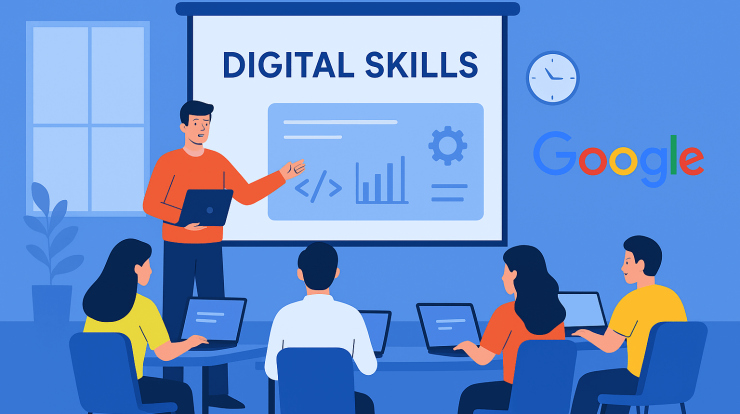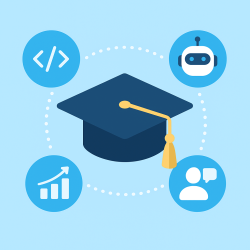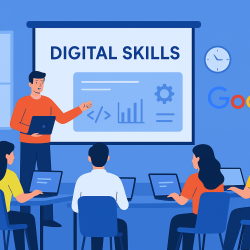
Introduction: The Urgency of Digital Skills
In the 21st century, digital skills have become as essential as reading and writing. Whether it’s coding, data analysis, artificial intelligence, or digital marketing, students and professionals need continuous learning to stay relevant in a fast-changing world. Global companies, particularly those with large presences in India such as Google offices in India, Microsoft, Amazon, and Infosys, are playing a key role in shaping the next generation through industry training programs that go beyond classrooms.
These initiatives bridge the gap between academic learning and real-world application, ensuring learners don’t just graduate with degrees, but also with industry-ready skills.
Why Industry Training Matters Today
Traditional education systems are often slow to adapt. For example:
-
Universities may take years to update curricula.
-
Emerging fields like AI or cybersecurity evolve monthly, not yearly.
-
Employers are demanding hands-on experience, not just theoretical knowledge.
This gap is exactly where industry training programs come in. By partnering with universities, hosting bootcamps, and launching their academies, global companies in India are empowering students to stay ahead.
For instance, the Google office in India has collaborated with higher education institutions to launch AI-focused training sessions, offering certification programs that students can showcase to employers worldwide.
Key Digital Skills Industry is Focusing On
Global industry leaders have identified five core areas that training programs emphasize:
-
Artificial Intelligence (AI) & Machine Learning (ML):
Courses on model building, neural networks, and ethical AI use. -
Cloud Computing:
Google Cloud, AWS, and Azure programs that prepare learners to design and deploy scalable solutions. -
Cybersecurity:
With rising cyber threats, companies train students in ethical hacking, security frameworks, and risk management. -
Data Analytics & Big Data:
How to analyze massive datasets, visualize insights, and apply predictive analytics. -
Digital Marketing & Communication:
Skills for managing campaigns across SEO, social media, and paid platforms.
Role of Google Offices in India
Among all global players, Google’s presence in India has made the biggest splash. Spread across Bengaluru, Hyderabad, Gurgaon, and Mumbai, Google offices in India have become hotbeds for educational outreach.
Key initiatives include:
-
Google Career Certificates: Affordable, online certifications in IT support, UX design, and data analytics.
-
Google for Startups Accelerator: Programs that not only train entrepreneurs but also involve students in solving real challenges.
-
Google AI Research Labs: Collaboration with universities to expose students to frontier-level innovation.
This approach demonstrates how corporate spaces can double as training hubs for students and young professionals.
Collaboration with Universities
Industry training programs succeed when academic institutions and corporations align. India is seeing this through:
-
Campus-to-Corporate Programs: Infosys, TCS, and Google offices in India run finishing schools for final-year students.
-
Hackathons & Innovation Challenges: Universities host competitions sponsored by tech hubs, giving students real-world problem-solving exposure.
-
Faculty Development Programs: Training professors to keep pace with digital transformation, ensuring knowledge trickles down to classrooms.
Opportunities for Students
For learners, these programs create multiple opportunities:
-
Employment Advantage: Students with Google-certified courses or AWS credentials are often fast-tracked in hiring.
-
Networking: Training programs connect them with global mentors, industry leaders, and potential employers.
-
Confidence in Emerging Tech: Hands-on labs and internships ensure students don’t just learn theory—they apply it.
Challenges in Implementation
Despite massive benefits, challenges persist:
-
Accessibility: Many rural students lack access to high-speed internet to join training sessions.
-
Cost: While some certifications are affordable, advanced programs may be out of reach for low-income learners.
-
Awareness Gap: Not all students know these opportunities exist.
-
Skill Mismatch: Training must adapt to actual market demand instead of outdated modules.
Google offices in India and other tech giants are working to reduce these barriers by offering free sessions, scholarships, and multilingual learning platforms.
Case Study: Google’s Digital Garage in India
Google’s Digital Garage initiative has empowered millions of students and small business owners by offering free, accessible training on digital marketing, website building, and online business growth. This initiative has become a blueprint for industry-led education support in India.
The Gurgaon Google office, for instance, has organized hybrid workshops where university students attend live mentorship sessions while simultaneously accessing online resources.
The Future of Industry Training in India
The future looks promising with several trends:
-
Micro-Credentials: Short, stackable certifications that allow students to prove specific skills quickly.
-
AI-Powered Learning: Adaptive platforms that personalize training for each learner.
-
Global Exposure: Partnerships with companies like Google, Amazon, and Microsoft give Indian students global credentials.
-
Public-Private Partnerships: Indian government schemes collaborating with global tech companies to reach millions.
By 2030, it’s expected that 50% of jobs in India will require advanced digital skills, making these training programs the cornerstone of employability.
Conclusion
Digital skills are no longer optional—they are survival tools in a tech-driven world. Through industry training programs led by global leaders like Google offices in India, students gain hands-on exposure, future-ready credentials, and pathways into exciting careers.
By blending corporate expertise with academic ambition, India is preparing a generation that is not just employable but also innovative, adaptable, and globally competitive.
For students, the message is clear: embrace lifelong learning, participate in industry programs, and turn digital skills into career superpowers.








